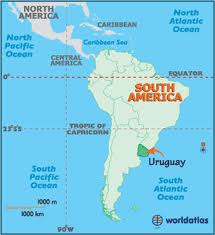Montevideo isn’t a densely populated city despite being the capital and the only major metropolis in Uruguay. The population of “panaderías” (bread shop), pubs, and restaurants is however quite dense lining the rustic streets of Montevideo’s midsection.
Spanish, Italian, and French immigrants in the last century may be the reason Uruguay exhibits this “bread” and “food” culture but also the reason for the particular type of Castilian Spanish that is spoken there. Entering into the “panadería”, the cashier quickly notices whether or not your accent is “rioplatense”, meaning from the Plata River. Uruguayans speak similar to Argentines from Buenos Aires (other metropolis in Plata River region) with a few variations.
The characteristic vocabulary extends far beyond the word “flauta” (small baguette) a common purchase at the panadería you just visited. In fact, down the block stands “un boliche” designated by the nightlife aficionados to be somewhere between a pub and a dance club. The group of friends that might visit one is called “una barra” and when they don’t call a taxi they go “a pata” or by foot. It may be that many of the expressions originate from the youth as other words include “joda” (party), “embole” (boring), “botija” (guy), “chiquilín/chiquilina” (friend or child), and “bárbaro” and “demás” (cool, as in great). Similar to several other South American countries, “Dale” is the common term for “ok”.
Whereas counties like Peru or Bolivia might have words originating from their indigenous populations, the lack of a current indigenous population in Uruguay has not produced this effect. However the expression “garra charrúa” while literally the strong grip of the Charrúa tribe, refers to courage and winning spirit. This tribe was nomadic and sparsely inhabited the Plata River region. The word “guarango” meaning “fool” comes from another tribal language, Guaraní, which has a strong presence in Paraguay and is one of the official languages of Mercosur, the powerful South American trade alliance of which Uruguay is a founding member. However again the European influence in Uruguay has had a profounder effect. “Andar” is a Castilian verb but is often used in Uruguay (and Mexico) to ask how someone is doing, “¿Cómo andas?”. And while this is a frequent expression, the replacement of “tú” and “usted” with “vos” for “you” happens more often on a daily basis. “Vos de donde sos” or “Vos querés algo” demonstrates that the conjugation of the third person singular has been modified with accentuation on the last syllable; this is called “el voceo”. Using “tú” would be more formal and using “usted would be the most formal.
The double L, very common in Spanish, is pronounced like the “j” in English. This is called “jeismo” and even includes the letter Y. While every Rioplatense uses “jeismo” younger generations and most Argentinians have transformed the “j” sound into “sh”. “Che” is a common expression to be used intermittently in dialogue but again predominates more in Argentina than Uruguay. What Argentines don’t do often is accompany “che” with “bo” or even use “bo” by itself. It is yet another term for “you” employed by close friends and usually males. While Uruguay is a small country and their television channels are mainly Argentinian they are proud to be “orientales” and to have their own dialect.
 The language is constantly developing and for example another Uruguayan word you won’t hear in Buenos Aires is “championes” for “athletic shoes”. While this may seem like a mundane word it is not for a country devout to one of the strongest soccer traditions of the world. With a little “garra charrúa” they will win a third FIFA World Cup and promote their culture and dialect one step higher. How’s that “flauta” you purchased from the bread shop?
The language is constantly developing and for example another Uruguayan word you won’t hear in Buenos Aires is “championes” for “athletic shoes”. While this may seem like a mundane word it is not for a country devout to one of the strongest soccer traditions of the world. With a little “garra charrúa” they will win a third FIFA World Cup and promote their culture and dialect one step higher. How’s that “flauta” you purchased from the bread shop?
For an overview of our translation expertise, visit our financial translation page



